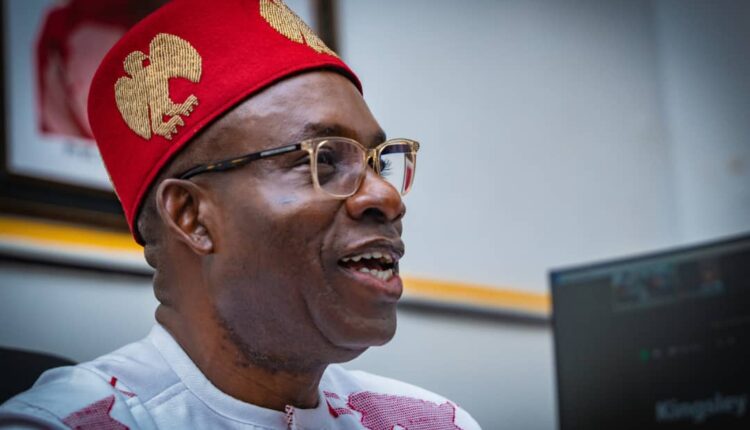
HOW SOLUDO FOUGHT TO SANITIZE NIGERIAN BANKS: THE UNTOLD STORY OF THE BANKING REFORMS!
By Christian ABURIME

(A must read. An in-depth analysis of how Soludo fought the intrigues/power play that characterized the Banking Reforms in Nigeria twenty years ago)
The intrigues and power play that swept through the banking reforms beginning from 2004 to 2005 can best be described as the ultimate test of courage and leadership!
On July 6, 2004, Prof Chukwuma Charles Soludo, then Governor of the Central Bank of Nigeria, CBN, delivered an address during a special meeting of the Bankers Committee at the CBN headquarter, Abuja, that was to change the financial landscape of the country in the banking sector.
This singular address caused the revolution that is today called the Nigerian banking reforms.
This was barely one month Soludo assumed duties as the CBN helmsman
Many of the Bankers present at that occasion could not believe their ears by the time Soludo was done with his speech. The announcement took the Nigeria’s policy arena by storm!
None of them had an inkling of what was about to hit them.
Infact, majority of them thought Soludo has gone beyond the realm of what was practically achievable !
Their hidden anger was that Soludo has just delivered a bombshell that mandated all commercial banks with a minimum of N2billion capital base to raise it to N25billion in 18 months
In that his famous speech, Soludo tactically warned these Bank chiefs, that it was not going to be business as usual.
Soludo told his audience point-blank that strengthening and consolidating the banking system will constitute the first phase of the CBN reforms under his watch, designed to ensure a diversified, strong and reliable banking sector which will ensure the safety of depositors’ money, play active developmental roles in the Nigerian economy, and be competent and competitive players in the African regional and global financial system.
The goal of the reform, Soludo said, was to help the Bank Operators become stronger players, in a manner that will ensure longevity and hence higher returns to the shareholders overtime and greater impacts on the Nigerian economy.
The ultimate beneficiaries of this policy shift, Soludo said, would be the Nigerian economy, the ordinary men and women who can put their deposits in the banks and have a restful sleep; the entrepreneurial Nigerians who can now have stronger financial system to finance their business and Nigeria economy which will benefit from internationally connected and competitive banks that would also mobilise international capital for Nigeria development
Soludo emphasized that the measure was about the Nigerian people, it was about positioning Nigeria and Nigerians to become competitive players in the 21st century
Soludo also envisaged a Nigeria of his dreams, saying to his audience: ” As I stand before you, I can visualize the Nigerian and world economy in the year 2025 and 2050. What I see is a world economy with no more than 10 – 20 mega-banks, all over the world”
He continued, “I see national and cross-national mergers and acquisitions taking place in massive scales. It will not be a world for marginal or fringe players”
Soludo hinted that countries that fail to proactively position themselves today will wake up then to continue to complain of marginalization
He continued, “I can see Asia consolidating, I see consolidation in Europe, America and South America.”
He disclosed to his audience that Consolidation is taking place in South Africa such that one bank in South Africa, Amalgamated Banks of South Africa (ABSA) has asset base larger than all of Nigerian commercial banks put together.
Malaysia, he said, has recently gone through its first round of consolidation whereby about 80 banks shrunk to about 12 within one year.
In Malaysia, Banks were required to raise their capital base from about $70 million to $526 million in one year. He told his audience
In Singapore ( with about three million people), banks have now consolidated to about six and further moving down to three with the second largest having a capital base of about $67 billion.
Where is Nigeria, Africa’s most populous country and potentially its largest economy? Soludo asked rhetorically
In Nigeria, we have 89 banks having capital base of less than US$10 million, and about 3,300 branches.
Compare this to 8 banks in South Korea with 4,500 branches or the one bank in South Africa with larger assets than all the 89 banks in Nigeria. Soludo asked his audience.
The truth, according to Soludo, is that, the Nigerian banking system remains very marginal relative to its potentials and in comparison to other countries even in Africa
“We have a duty to be proactive, and to strategically position Nigeria banks to be active players and not spectators in the emerging world.” Soludo continued
According to him, the inability of the banking system to voluntarily embark on consolidation in line with the global trend has necessitated the need to consider the adoption of appropriate legal and supervisory framework as well as a comprehensive incentive package to facilitate mergers and acquisition in the industry as a crisis resolution option and to promote the soundness, stability and enhanced efficiency of the system.
Continuing, Soludo said to his now pensive audience, that at the end of June, 2004 there were 89 deposit money banks operating in the country comprising institutions of various sizes and degrees of soundness.
Structurally, Soludo said the sector was highly concentrated, as the ten largest banks account for about 50 per cent of the industry’s total assets/liabilities.
According to Soludo, most banks in Nigeria have a capitalization of less than $10 million. Even the largest bank in Nigeria has a capital base of about US$240 million compared to US$526 million for the smallest bank in Malaysia
This assessment, Soludo said shows that while the overall health of the Nigerian banking system could be described as generally satisfactory, the state of some banks was less cheering!
The weaknesses of some of the ailing banks, Soludo insisted, are manifested by their overdrawn positions with the CBN, high incidence of non-performing loans, capital deficiencies, weak management and poor corporate governance
The fundamental problems of the banks, Soludo revealed, particularly those classified as unsound, have been identified to include: persistent liquidity, poor assets quality and unprofitable operations.
In addition to the above, Soludo also pointed out to the Bank Chiefs of the recent developments in the system which has been of great concern to the monetary authorities was the significant dependence of many Nigeria banks on government and parastatals, accounting for over 20 per cent of total deposit liabilities of deposit money banks.
There were some banks where dependency ratios were in excess of 50 per cent. The implications, according to Prof Soludo was that the resource base of such Banks were weak and volatile, rendering their operations highly vulnerable to swings in government revenue from the uncertainties of the international oil markets
The summary from the fore-going , Prof Soludo said, was that the Nigerian banking system faces enormous challenges which if not addressed urgently could snowball into a crisis in the near future
” We don’t have to wait for the crisis to explode before we act”. Soludo stressed
” The Nigerian banking system today is fragile and marginal. Our vision is a banking system that is part of the global change, and which is strong, competitive and reliable. A banking system which depositors can trust and investors can rely upon”. Soludo added
Soludo in his speech also called for a ” Moral face” and for the banks to live up to some medium of social responsibility; saying that it is in this context that the CBN view with serious concern the state of frauds, ethical misconducts, falsification of returns by the banks to the Central Bank, unprofessional use of female staff in some banks in the name of ” marketing” etc
“Collectively, we can stop these misconducts and give the system a new face.” Soludo advised
Banks were also expected to imbibe best-practice corporate governance, improve on self-regulation, enhance the capital base, institute IT driven culture, and seek to be competitive in today’s globalizing world.
Diversification of the productive base of the economy was also a fundamental challenge of economic management, which Soludo harped on, and banks he said will increasingly be challenged to become more innovative in their intermediation function and especially to increase financing to the productive sectors
The regulatory authorities, Soludo said, on their part, could further streamline the regulatory framework and strengthen the supervising capacity to endure a sound and efficient system.
“Indeed, it is not enough to have a vision, we must act now !” Soludo reaffirmed
It was with these words that Prof Soludo reeled out the 13-point Agenda of which the number one was the most fundamental point which was the requirement that the minimum capitalization for banks be raised to N25billion with full implementation before the end of December, 2005. And only the banks that meet the requirement would hold public sector deposits, as well as participate in the DAS auction by end of 2005; and the names of banks that qualify will be published by 31st of December, 2005
With this bombshell, Soludo literally stepped on toes.
Many of the Bankers thought they were day-dreaming as they could not believe their ears.
The Bank chiefs in utter disbelief looked at one another as the entire hall went silent!
To them, Soludo has done the unthinkable.! This was unimaginable! Where on earth were they going to raise this humugous amount of money?
As the minutes were ticking away and temperature rising in a now tense atmosphere, the Bank chiefs were making frantic efforts to bar the media from reporting this information.
But unknown to them, before they left the venue, the news has filtered out.
The media was already having a field day, as the “Soludo consolidation” news spread like wild-fire
Interestingly, some of the Bank chiefs who knew they could not meet the N25 billion capital base requirement were not ready to lose their banks. They were ready to fight dirty if the need arises to protect their banks.
Soludo, on the other hand, was not ready to budge. To him, banks must operate in a proper fashion as it is done globally.
And so the stage was set for a titanic battle between Soludo and the opposing forces !.
Who will blink first? Soludo or the powers that control the banks? And how did Soludo survive it?
…to be continued!
(Tomorrow, Watch out for the concluding part of the “Titanic Battle” between Soludo and the Opposition forces!)
Note: This article was first published in October 2019 by Christian Aburime!


